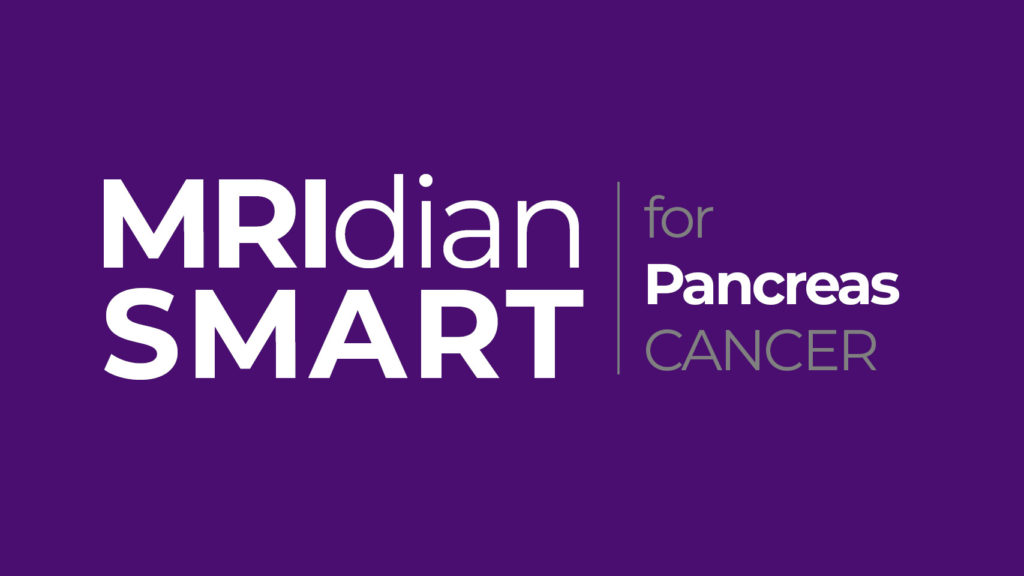MRIdian A3i SMART for Pancreas Cancer
For Patients

Potential extended survival, improved quality of life
Pancreatic cancer is among the deadliest types of cancer. While the incidence is comparatively low—it’s the 12th most common type of cancer diagnosed worldwide1—mortality is high, with most patients succumbing to their disease within one year of diagnosis.2
- MRIdian A3i may be an option for patients who otherwise may not be offered treatment.3,4,5
- Treatment may be completed in just five sessions of radiation therapy.3,4,5
- Potential to extend survival, reduce toxicity and improve quality of life.3,4,5
Results from 148 inoperable pancreatic cancer patients treated with ablative doses of MRIdian A3i SMART (MR-guided stereotactic adaptive radiation therapy) have already demonstrated improvement in overall survival and quality of life, with findings showing longer median survival nearly doubling what it is with chemotherapy and standard radiation therapy. Findings showed longer median survival of 26 months compared to 12-15 months typically seen in patients receiving chemotherapy and standard radiation therapy.6 The 2-year overall survival was over 50%, which is more than double the expected 2-year rate of 20% with lower dose radiation.6
For Important Safety Information click here
Learn how MRIdian works for pancreas
Hear from a patient who traveled from Scottsdale, AZ to Miami, FL for MRIdian treatment

For Important Safety Information click here
ViewRay is a proud sponsor of Pancreatic Cancer Action Network (PanCAN). Pancreatic cancer affects many areas of the patient’s life. Get supportive information to on this journey. Call PanCAN today.

Pancreas Patient Videos
To learn more about ongoing clinical trials for pancreas cancer, visit our Clinical Trials page.
MRIdian Awareness Partners
Where can I go for more information?
Please contact your healthcare provider with any questions or concerns.
Important Safety Information
Indications for Use (IFU): The MRIdian Linac system, with magnetic resonance imaging capabilities, is intended to provide stereotactic radiosurgery and precision radiotherapy for lesions, tumors, and conditions anywhere in the body where radiation treatment is indicated. The MRIdian Linac System is not appropriate for all patients, including those who are not candidates for magnetic resonance imaging.
Important Safety Information (ISI): Radiation treatments may cause side effects that can vary depending on the part of the body being treated. The most frequent ones are typically temporary and may include, but are not limited to, irritation to the respiratory, digestive, urinary or reproductive systems; fatigue; nausea; skin irritation; and hair loss. In some patients, side effects can be severe. Treatment sessions may vary in complexity and duration.
Radiation treatment is not appropriate for all cancers. You should discuss the potential for side effects and their severity as well as the benefits of radiation and magnetic resonance imaging with your doctor to make sure radiation treatment is right for you.
Disclaimer: The opinions and clinical experiences presented herein are specific to the featured physicians and the featured patients and are for information purposes only. Nothing in this material is intended to provide specific medical advice or to take the place of written law or regulations. Results of treatment presented in the videos and information on this webpage are not indicative of typical or future results.
Discuss treatment options with your doctor, including the risks and benefits of the entire course of treatment specific to your individual needs. MRIdian Linac systems are only available at appropriately equipped facilities with specially trained physicians.
Citations
- Ferlay, J., et al. (2018). Global Cancer Observatory: Cancer Today. Lyon, France: International Agency for Research on Cancer. Retrieved August 30, 2019 from https://gco.iarc.fr/today
- United European Gastroenterology. (2018). Pancreatic cancer across Europe: Taking a united stand. Retrieved May 5, 2020 from https://www.spg. pt/wp content/uploads/2018/11/Pancreatic_Cancer_Report.pdf
- Rudra, S., Jiang, N., Rosenberg, S. A., Olsen, J. R., Roach, M. C., Wan, L., et al. (2019). Using adaptive magnetic resonance image-guided radiation therapy for treatment of inoperable pancreatic cancer. Cancer Medicine, 8(5), 2123–2132.
- Herman, J. M., Chang, D. T., Goodman, K. A., Dholakia, A. S., Raman, S. P., Hacker-Prietz, A., et al. (2015). Phase 2 multi-institutional trial evaluating gemcitabine and stereotactic body radiotherapy for patients with locally advanced unresectable pancreatic adenocarcinoma. Cancer, 121(7), 1128–1137.
- de Gues, S. W. L., Eskander, M. F., Kasumova, G. G., Ng, S., C., Kent, T. S., Mancias, J. D., et al. (2017). Stereotactic body radiotherapy for unresected pancreatic cancer: A nationwide review. Cancer, 123(21), 4158-4167
- M. D. Chuong, C. Kirsch, R. Herrera, M. Rubens, G. Gungor, E. M., et al. (2021). Long term multi-institutional outcomes of 5 fraction ablative stereotactic MR guided adaptive radiation therapy (SMART) for inoperable pancreas cancer with median prescribed biologically effective dose of 100 Gy 10. ASTRO 2021 Conference Abstract
















